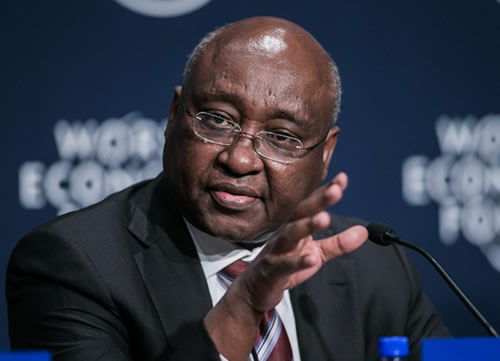
Donald Kaberuka
Donald Kaberuka’s term as President of the African Development Bank, (AfDB) ends today, August 31, 2015 and as he walks out of the doors of his Abidjan office, he would become known as a Former President.
His tenure ends after what staff of the multilateral organization describe as the most successful 10 years in the history of the Bank.
The 63-year-old Rwandan citizen was first elected in 2005 for a five year period. He got re-elected for a second five-year term in 2010.
In a speech at the opening of the 50th Anniversary Meeting of the Bank in Abidjan in May 2015, Dr. Kaberuka said he will handover to the new President on September 1, 2015, when his tenure ends on August 31.
He stated that when he was elected, he received 78 per cent of the votes.
The in-coming President, Dr. Akinwumi Adesina was elected May 28, 2015 after a tense day of voting and expectations at the Annual Meetings of the AfDB in Abidjan, Ivory Coast.
Dr. Adesina, after six rounds of voting, won the election with 58.10 per cent of total votes cast and regional votes of 60.5 per cent.
Dr. Kaberuka will handover to Dr. Adesina, making him the eighth president of the Bank. He was Nigeria’s Minister of Agriculture.
Before joining the Bank, Dr. Kaberuka had a career in banking, international trade and development and government service. He served as Minister of Finance and Economic Planning between 1997 and 2005 in his native country, Rwanda. During this period, he oversaw Rwanda’s successful economic reconstruction after the end of the civil war In that country.
With Kaberuka’s high success records, there would be are very high expectations of Dr. Adesina.
The Bank almost shut down after losing its AAA credit rating in 1995. Omar Kabbaj became Bank President that same year and tightened controls to regain the AAA status.
Kaberuka took over in 2005, and then the Bank made a dramatic turn-around by refocusing on the core needs of its member countries, and re-strategizing.
During his 10-year term from 2005, the Bank’s capital has tripled to $100 billion, and the Bank has made massive investments in development projects around Africa.
Under his tenure the AfDB has collaborated and often competed with other multilateral organizations like the World Bank and International Monetary Fund, working hard to make itself relevant to and ahead in Africa’s economic, social and political development.
When at a press conference in Abidjan during the Annual Meetings of the Bank in May 2015, this writer asked him if he had any regrets for not being able to achieve some of his goals and objectives for the Bank, he answered, “leaders don’t have to regret anything.”
And when another journalist asked him if he thought his legacy at the Bank would be continued after he leaves, he responded, “I am not a legacy man. The achievements of the Bank are a collective one. It’s not a one-man show,” he said.
The Bank operates under the leadership of the President, who serves as the legal representative of the Bank, the Chairperson of the Board of Directors, and the Chief of Staff of the Bank.
Elected by the Board of Governors, the President serves a five-year term, renewable once.
The Bank invests about $8 billion annually into Africa’s economy.
Source: Ghana Business News























